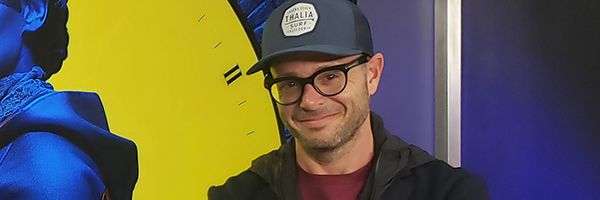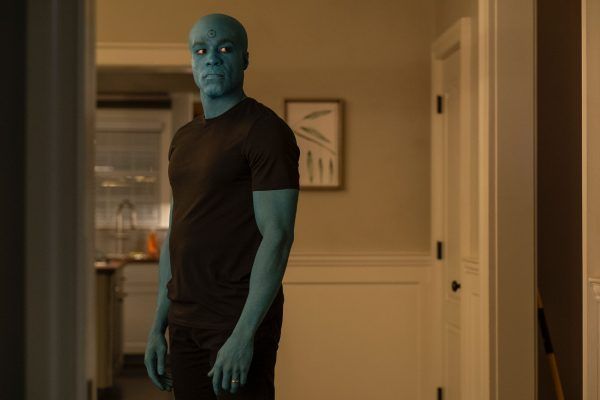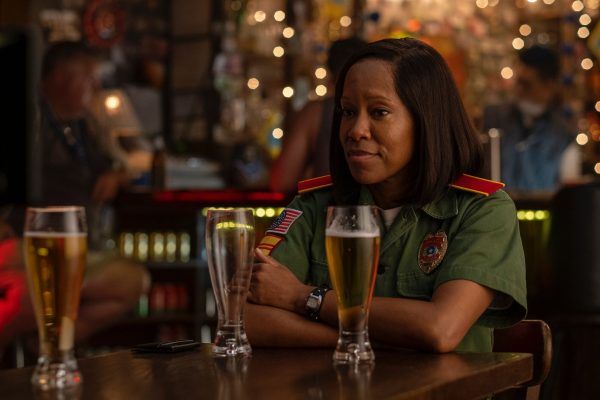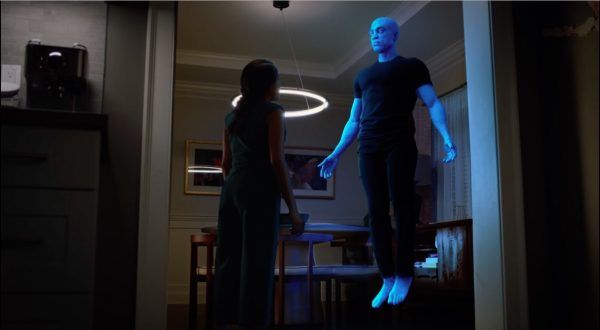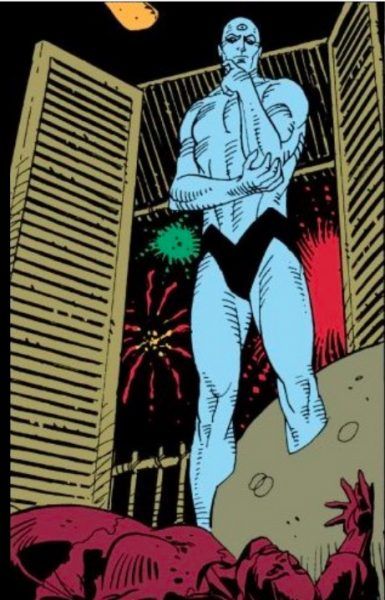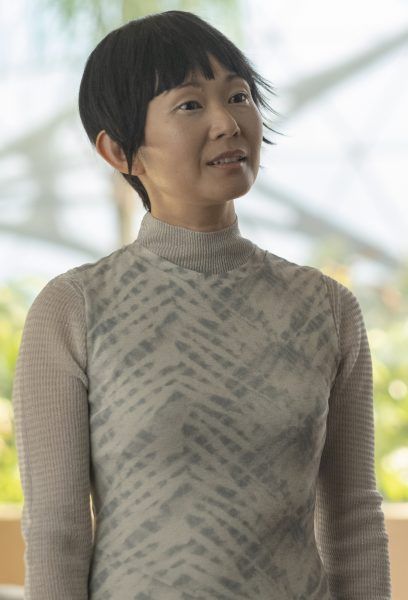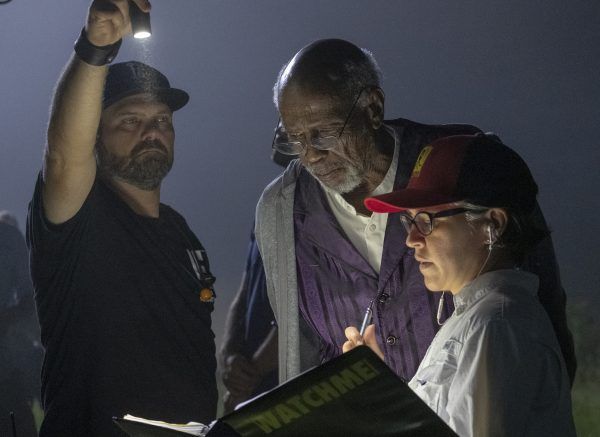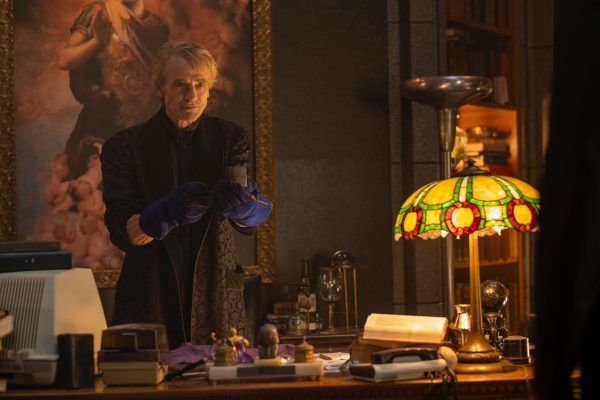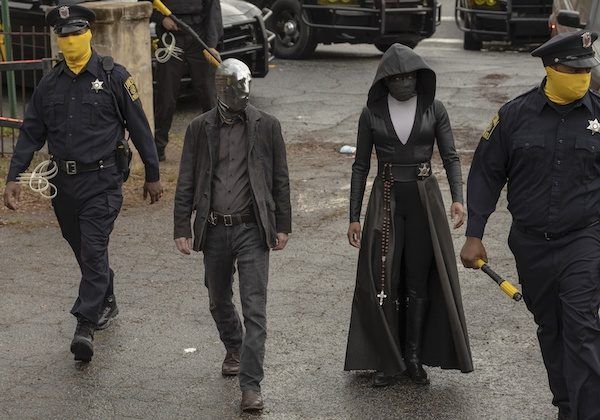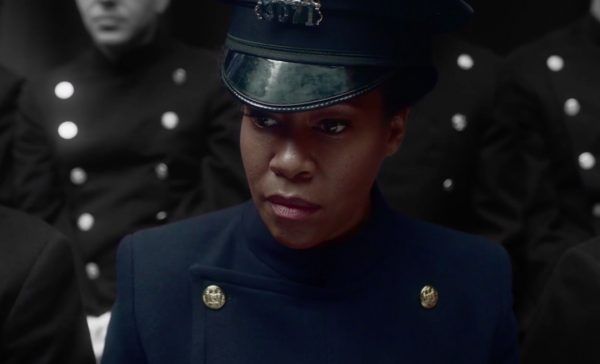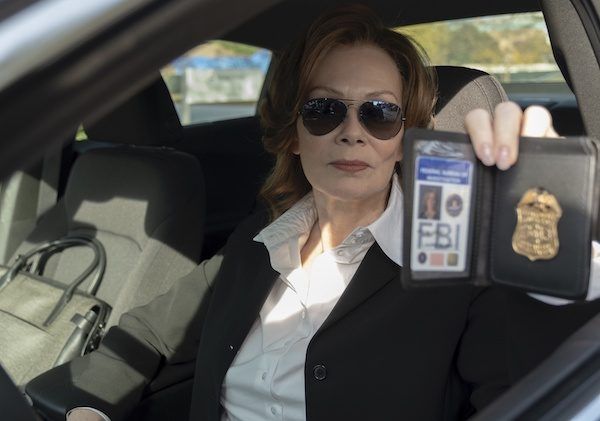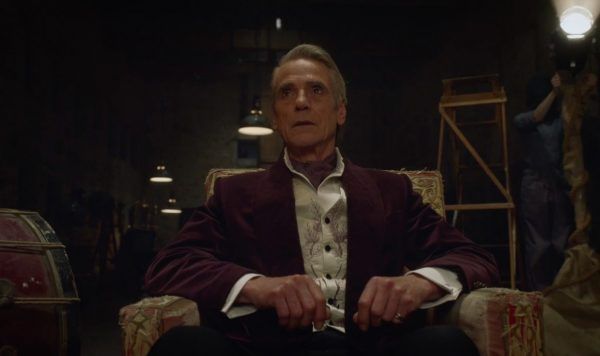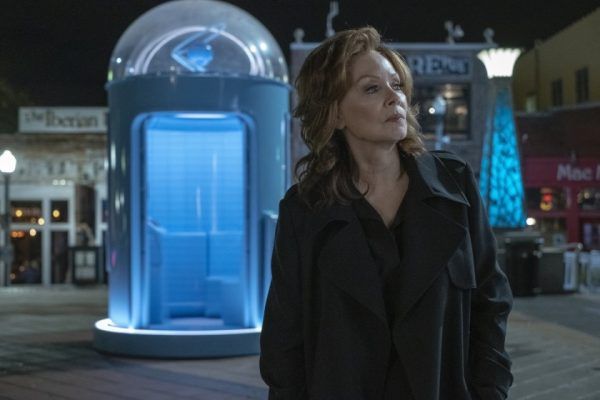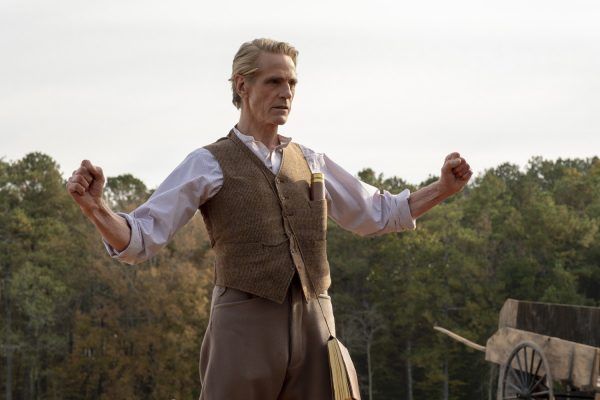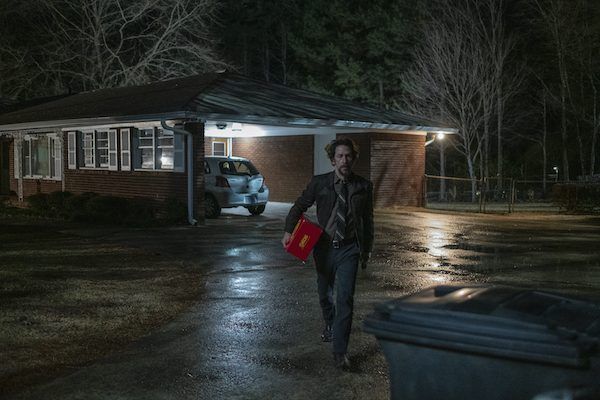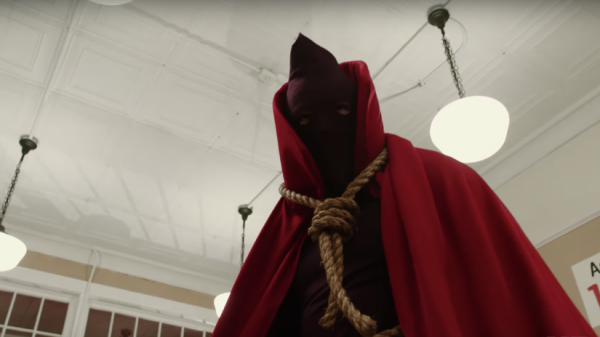Warning: Watchmen spoilers are discussed in this interview
With HBO’s Watchmen having aired its season finale this past Sunday, a few days ago I got on the phone with showrunner Damon Lindelof to talk about the amazing season. While I had high expectations due to Lindelof’s previous work on The Leftovers and Lost, I’ll fully admit Watchmen flew well past my lofty expectations and delivered a thought provoking, expertly crafted, and brilliantly told series that was easily my favorite show of 2019. I’ve rewatched every episode and I might watch it again. The highest compliment I can give to everyone that worked on Watchmen is I think even Alan Moore would like it.
Since Lindelof did some interviews before I spoke to him, I made sure to use my time to ask things that he hadn’t been asked. We talked about if Watchmen should have a second season, how the writers decided on Dr. Manhattan’s (Yahya Abdul-Mateen II) powers and weaknesses, how much of Lady Trieu’s (Hong Chau) backstory did they figure out and how close did it come to being shown in the series, why only nine episodes, why Angela (Regina King) was hooked up to the elephant, how close the writers got to having a scene with Laurie (Jean Smart) and Dr. Manhattan, if they approached Robert Redford about the series, if they considered bringing back Dan Dreiberg and where he is now, deleted scenes, how the writers designed the show, who he wants to make sure gets credit for helping to make Watchmen, and a lot more.
Check out what he had to say below.
COLLIDER: I've repeatedly said Watchman is my favorite show of 2019. What you guys did is impossible. All these people are talking to you about season two, and will you do it, or should there be a season two? You touched the third rail and you not only survived, but you made something people love. Is there an element in your brain you're like, "Fuck it. Why do I even want to play with this again? I did it."
DAMON LINDELOF: I know what you mean. And, I'm profoundly grateful for everything that you just said and I don't want you to feel like I'm just moving beyond you having said it. Because, you and I go way back, A. And, also, you represent a part of the culture that I consider myself a part of, as well. So, that the level of validation in your words is deeply important to me. And, I don't want it to feel like I'm being gracious when I say, "I don't want to do anymore." It actually has nothing to do with having gone through the experience, or survived it, or what everybody's perception is. And, everything to do with the fact that we just put it all on the field. And, I think that the reason that... If you believe that this season worked, the reason that it worked was that we put it all on the field. And, that we didn't save anything for subsequent seasons, or, “Let's answer that mystery later.”
It was sort of like, "This is what we're doing, this is how we're going to do it." And, I do feel like it's not rocket science to essentially say, the longer a television show goes on, especially one like this, with mysteries and character arcs, et cetera. The longer it goes on, the more complicated it becomes. I have some firsthand experience with this. So, the idea of designing something to be pretty tight, and it's storytelling reckoning. I could only focus on this story, in order to do the job effectively. And, so I get that. As someone who loves this kind of storytelling, I get why the culture wants to know when there's going to be more. And, I'm just trying to reframe the question to be, if there should be more. That's of tantamount importance to me, at this juncture.
I'm of the opinion that if there is never another season of Watchmen, I'm fine with it. Or if they want to wait 10 or 20 years to do another story.
LINDELOF: Yeah.
You know.
LINDELOF: Hallelujah.
I'm being serious. Not everything needs a sequel.
LINDELOF: I am too. I'm, I'm saying, my hand is in the air and I'm saying "Hallelujah. Preach." I completely agree with you.
Yeah.
LINDELOF: Look at The Prisoner man. I mean the fact that I can say, "Look at The Prisoner, man" and you know what I'm talking about, is there was no season two of The Prisoner.
How did you and the writers come to define Dr. Manhattan's powers and weaknesses? If you could go into that a little bit.
LINDELOF: First off, when you say me and the writers, there was not a consensus opinion. I think the cool thing is that there were multiple different interpretations, about what Dr. Manhattan's powers were, and what his limitations were. And, those conversations were like... As someone with a Judaic background, we're Talmudic. That idea of, you question the original text, and then that provokes conversations, and then there are different interpretations. I think, that there's only one person who could probably answer what Dr. Manhattan's powers are, empirically. But, because that person was not available to us, it left us to sort of say like, "Well, here in issue three he appears to be doing this. So, that would seem to suggest that he could also do this.” And, “no he can't.”
So, only because there was vigorous debate and disagreement. Were we able to lock in on what our version of Dr. Manhattan could and couldn't do. His primary limitation and vulnerability is who he is, as a human. Jon Osterman. And, Jon Osterman's fundamental weakness, for lack of a better word, or vulnerability, at least for someone who has superpowers, is that he's a fairly passive guy. He's not a guy who wanted to change the world. He's just a guy who kind of wanted to exist in it. So, when you take a guy like that, and you give him more power than anyone has ever had, he's going to be limited by that passivity. And, he seemed to be more interested in falling in love, than he did in saving the world. If you look at the original text and both our Watchmen, I feel like both of those ideas are consistent.
When it comes to, what I would argue, was the biggest leap that we took in terms of what Dr Manhattan's powers were, it was, "Can this guy appear as human, if he chooses? And if so, why didn't he do it before?" That, I think, was the idea that we wrestled with, more than anything. And, once we decided that he could, it was important for us to put that debate into the mouths of our characters, from the jump. So, as early as episode two, you have Will Reeves theorizing, that Dr. Manhattan could take human form. And, Angela pushing back against that idea, when both of them know that he can. Angela knows that he can, because she's married to him. Will Reeves' knows that he can, because he visited him 10 years earlier. But, they're both holding their cards very closely to their chest. But, we had to signal to the audience that that was on the table. I think if we hadn't allowed for that conversation, it wouldn't have been a fair card to turn over, later in the season.
How much of Lady Trieu's backstory did you actually figure out? And, how close did you guys get to showing more of it?
LINDELOF: Well, the answer to the first part is, a lot more than we were able to show on screen. And, I think that, if there are any regrets, it's that we didn't get to dimensionalize Lady Trieu as much as we did in the writer's room, on the screen. Especially given, in my opinion, the magnitude of [Hong Chau’s] performance. I just thought she was fantastic. And, it was one of those things where we got into the end game of the season, and it felt like we were moving back too much, between episode seven and eight. And, we talked about Lady Trieu's childhood, how she became who she was. But, a lot of her backstory got shorthanded. Between, what Bian is saying to Angela and Lady Trieu is saying to Angela, in episode seven.
And then, of course, the entire beginning of the finale is all about Lady Trieu's backstory. So, we talked about a lot more. There is a lot more, that we didn't get to do. We knew that she was Veidt's daughter from the very early going. And, the reason that I know this is, one of the things that I kept screaming at the top of my lungs, in frustrated fashion, and at least in my memory I would bang on the table, is I would say "We're not doing Watchmen babies! That's what everybody wants. We're not doing it." These characters don't need to be connected to the old Testament characters. We can create our own characters, that don't need to be tied to the original Watchmen. We're not doing Watchmen babies.
And lo and behold, Angela is Hooded Justice's granddaughter, Lady Trieu is Veidt's daughter. And, we had to allow for some Watchmen babying, in order to tell the story that we wanted to tell. So, I was resistant to it, but then I was eventually overwhelmed by its rightness. And, it's interesting [with] Rise of Skywalker. Because, you're seeing, at least in the fandom, anticipating the same question, which is, "Should it be Star Wars babies, or shouldn't it?" And that, to me, is always the question that we're dealing with, as writers of fanfic, now. Which is, "Should we be doing blank babies or should we be forging our own paths?" Up for debate.
Obviously, you're getting a lot of the limelight. Because you're the showrunner, and you wrote so much of Watchmen. But, I want to make sure that some of the spotlight also shines on some of the other people that were key contributors to the creation and writing of Watchmen. So, who do you want to make sure it gets a little bit of the limelight, in terms of people that worked with you on the show that really helped shape the narrative, and come up with key decisions?
LINDELOF: I would never stop talking, if I named them all by name. I will say, every single writer in that room deserves recognition. From the initial 12 week period, to the writers who were credited. So, I'll say their names. Cord Jefferson, Claire Keichel, Stacey Osei-Kuffour, Nick Cuse, Jeff Jensen, Christal Henry, Brandon Jacobs Jenkins. Who am I forgetting? Janine Neighbors, Ryan Lipscomb, who is the writer's assistant, but, contributed immensely to the show. Tom Spezialy, oh my God, I can't believe I forgot him. Listen, for two years, for longer than two years, because it was two years ago, this week, that I first sent the written pilot to Nicole Kassell. Who is another name that should be thrust into the limelight, alongside Steven Williams, who basically ran the show in Atlanta, co-ran the show. And, each one of them directed two episodes, and they helped oversee the other ones. Just immense.
Greg Middleton, one of our directors of photography, who shot episode six, and half of the other episodes. Incredible. And, our production designer Kristin Milstead. The design appetite for this show, off the charts. Eric Henry and Matt Robken can are vis effects supervisors. Who, basically, were still filing shots that aired last night, up past Thanksgiving. And, had the incredible challenge of trying to make Dr. Manhattan seem real, on a limited television budget. And, reading that finale and realizing that we are going to have a quantum centrifuge floating in the sky, a hail of squid, Dr. Manhattan, visually rendered Karnak. All of that, in the space of 65 minutes. Just, an almost impossible task to achieve.
Our sound design team, again, there's too many to name. Trent [Reznor] and Atticus [Ross] and Liza Richardson, who provided all the music over the course of the nine episodes. All of those names deserve landslides of beyond limelight. I think that you're accurate in terms of saying, our culture is designed to both celebrate and blame the show runner. This is a case where, had the show not worked, all of the blame should have fallen on my shoulders. Because, I make key creative decisions, that would have led us into ruin. Instead, I made key creative decisions that only worked because of all of those collaborators. So, they should not only just share the limelight, but, I should be standing behind them. Because, that's how it felt to me. And, I watched the show. And, this is one of the few things that I'm responsible for, that I truly love. And the reason that I'm proud of it and that I love it is because it feels like it wasn't mine.
The original graphic novel is 12 issues, which ties into the symbolism of the watch and the doomsday clock. Early on, had you considered nine episodes? Because, nine months for gestation, there's a lot of egg symmetry or symbolism with nine. Or was it sort of natural, because that was what the story gave you?
LINDELOF: I think it's the latter. The original plan was to do 10. And, then, I think around the time that Henry had written the scripts for four and five, and understanding what episode six was going to be. And, six needed to happen exactly when it happened in the season, in our opinion, that we felt like once six ended, that we were closer to the ending than we were to the beginning. Six didn't feel like a mid point. It felt like, we now know everything that we need to know to move into the end game. And, every way that we looked at it, it felt like if we were going to do seven, eight, nine and ten, one of those episodes was going to be filler. And, I was like, "We're just not doing the filler episode. We know exactly what we need to do, in our end game. And, it's time to start doing it. I don't want to stall."
So, it ended up feeling like nine was the right number. I don't think that there's a lot of precedent for nine episode seasons. We've all decided on even numbered seasons as the metric by which a normal television season is. It's fine if there's six episodes of Fleabag, that feels right. It's fine if there were eight episodes of The Leftovers, or six episodes of a season of Game of Thrones. Because, Watchmen is such an odd show, it felt fitting that there should be an odd number of episodes.
Have you revealed or explained why Angela was hooked up to an elephant?
LINDELOF: Have we revealed or explained it? No, I think that all the explanation that we're willing to offer is, in show, in Lady Trieu's tutorial, for the process of removing Will's memories, from Angela, and placing them into a host, which is the elephant. But, in terms of why an elephant? I think, that some of the theorizing that I've seen online is very accurate, in terms of what our intention was. Also, just on a personal level, I think that the original Watchmen had a sense of play, and punnery. And, I think that the idea of an elephant never forgetting, or needing to talk about the elephant in the room. And, the elephant being the symbol of the mythical Lady Trieu. And, all the things that an elephant represents. Those were all significant parts of our thinking, too. So, the idea that there is some big mystery underlying that choice, is not accurate. Everything I just described to you, is sort of why we made the choice that we did.
How close did you get to having a scene with Laurie and Dr. Manhattan?
LINDELOF: Other than just the one where she sees him in the cage in the finale?
Exactly.
LINDELOF: How close? Well, we talked about it a lot, and we seriously considered it. And, we failed to come up with one that passed our standards of inclusion. So, it's hard for me to quantify how close we got, other than to say, seriously considered it, tried multiple iterations of it, couldn't come up with a version that was satisfying to us and so, didn't.
For me, I love that they don't have a scene, because it feels real. It sort of feels like life, to me. That sometimes you want something and it's just not going to happen, for whatever reason.
LINDELOF: Right. Yes, there is that. And, there's also, I think that Laurie actually did have multiple scenes with Dr. Manhattan, she just didn't know he was Dr. Manhattan. And, my hope is that when you go back and rewatch those interactions that she had with Cal, or you hear Cal describing interactions that he had with Laurie, that those were the scenes.
Good point. I actually forgot about that.
LINDELOF: Yeah, they have a couple. They have one on camera scene and one off camera scene. Both of which, we delighted in writing. Because, she doesn't know that’s who he is. But, she made multiple references to Cal, when you realize she was inadvertently describing Dr. Manhattan. I think there's something delightful there, as well.
Did you guys ever approach Robert Redford for a cameo?
LINDELOF: We wrote Robert Redford a letter, describing our intention with his usage in the show. And, also, what our general sense of what Watchmen was to us. And, an incredibly high esteem in which we hold him both as an actor, and a purveyor of the arts. And, also, as a prominent progressive liberal, who shares many of the same ideologies with a number of us, behind the scenes. And, we left the door open in that letter, should he choose to respond to it, that we would invite him to come and play on the show, if he were game. He's a very busy man, and he has yet to respond to the letter. But, hopefully, one day we will cross paths, and that door will always be open.
Did you ever consider having Dan Dreiberg play a role in the series?
LINDELOF: Oh my God, yes. I would say that we committed, it's hard to quantify hours. But, if someone said that we kicked around that possibility for 40 hours of overall room time, that would feel a little low to me. But, one of the things that we are constantly trying to solve for, was the ratio between old and new. And, I felt very strongly that Laurie needed to be in this show. And, I felt very strongly that Manhattan needed to be in the show. And, I felt very strongly that Veidt needed to be in the show. And, we knew that the central character of the show was Hooded Justice and his granddaughter. It felt like, if we added Dan into the mix, that the balance tipped too much towards the old, and not enough towards the new. But, we did discuss multiple versions of what it would look like for him to appear. We ended up with Archie.
Yeah. What were you thinking, though? In your brain, where was Dan, years after the events of Watchmen? Did you guys come to a consensus on what he might be doing?
LINDELOF: Yeah. Yes. Not to lean too heavily on the Peteypedia, but the Peteypedia is canon. And, a lot of the thinking that went into some of the creative decisions that we made on the show, we covered in Peteypedia. And, also, in the in-world, Trent Reznor and Atticus Ross did three LPs. All of which have liner notes and in-world writing. All of which was done by us, in the writer's room, primarily by Jeff Jensen. But, all of us, collectively. So, those materials deal with Dan Dreiberg. And, I'm not spoiling anything to say that, it is revealed that following the events of the original Watchmen, Laurie and Dan did, in fact, go back into costume vigilantism. Laurie as the Comedian, and Dan, still, as Nite Owl.
Their relationship did not turn out too great, and they ended up breaking up. But, before they broke up, they took down Timothy McVeigh, who was en route to destroy the federal building in Oklahoma City. So, they prevented that from happening. But, in doing so, were arrested by the FBI. Laurie made a deal with the FBI, Dan did not. And, he is still in federal custody to this day. That's the story.
I like that. I like that a lot. Since all of the Veidt scenes were shot at once, who directed them?
LINDELOF: The episodic directors of those episodes, directed the Veidt scenes, in Wales. So, we knew, before we started the season, what the episodic assignments would be. So, I think, with the exception of the finale. I believe Nicole Casell directed the Veidt scenes, for the finale. Maybe a combination of Nicole and Steven Williams. There's a scene where he's in the jail cell, he sees the ship landing. And then the subsequent scene when he comes outside, and he gets shot by the Game Warden and ends up boarding the ship. I believe that's primarily Steven Williams, but I think Nicole directed some of that stuff. But the episodic director of the finale was Fred Toye.
So, he was the only unassigned director at the time that we shot Wales. But, then, all the other stuff was directed by whoever directed that episode. We flew them to Wales, they prepped that stuff. They work for three or four days, and then they did it. With one other exception, which is, Coralie Fargeat directed the Wales work for Adrian Veidt's trial, in episode seven. But, we had a production hiatus that rearranged schedules. And so David Semel came in and directed episode seven, and he inherited Coralie's Veidt scene. But, he directed the remainder of episode seven. But, with those exceptions, the episodic directors of those episodes directed the Veidt stuff.
You have an amazing memory. One of the brilliant things about the show is, how everything is thought out, and set up, and layered, through all nine episodes. It's another Watchmen graphic novel. What is it like to do that in the writer's room? And, how much is reshot, or added later, when you start realizing other things? Because, one of the reasons I think the show is so incredible, is just how much is there.
LINDELOF: Again, thank you for saying that. I feel like this is a really exciting time to be a storyteller in the medium of television. Because, the idea of creating a story that is as long as it needs to be, is now possible. Whereas in the past, I think that the idea of, “how long was the show going to be?” Well, it just kept on going as long as it was successful, etc. We all went into this with the intention of, "Let's make a season of Watchmen. Let's have it have a beginning, middle and end. Then, we'll worry about what comes next. But, every great idea we have, let's put it into this season.” And, as it relates to reshoots and additional material, I can comfortably say that we went and reshot some stuff for the pilot, that was not significantly different than what was it in the original script. But, there were some tonal variances that we learned along the way.
There was a major character named Pirate Jenny, who in the original design of the season was going to be large, and we cast this great actor, Adelaide Clemens. But, then, after we shot the pilot, we realized that Jenny and Red Scare and Panda, were actually going to be much less significant characters. And that we are going to be focusing on Angela, and Veidt, and Laurie, and Looking Glass. And, so, when we communicated that to those actors, it felt like we were doing Adelaide a disservice. So, we recast Adelaide with Jessica Camacho. So, we reshot all of the Pirate Jenny stuff.
That's pretty much really all we did in the pilot. And, then, all of the subsequent episodes, I'm hard pressed to think of anything that we re-shot. We did, as I said, have to shut down for about five weeks, to catch up on scripts. And, also, we knew that the ambition of episode six was going to kill us. So, we needed more time to prep that episode. So, we had written episodes five and six, but we shut down to catch our breath and write episodes seven, eight and nine. But, we didn't do any reshoots. What aired is what was in the script.
Did you end up with a lot of deleted scenes, or are there any deleted scenes?
LINDELOF: I don't think there are. I don't think there are any deleted scenes. I think that there are lines that we lifted out of scenes, but I don't think there are any scenes that we shot that didn't end up in the show. That feels, as I'm saying it, ridiculously impossible. So, let me check back and verify with you, at a later date. But, I don't think there are any deleted scenes, to my knowledge.
For more on Watchmen, here’s Lindelof explaining the final shot, who is the Lube Man, and how a huge easter egg was hidden in the teaser poster.

